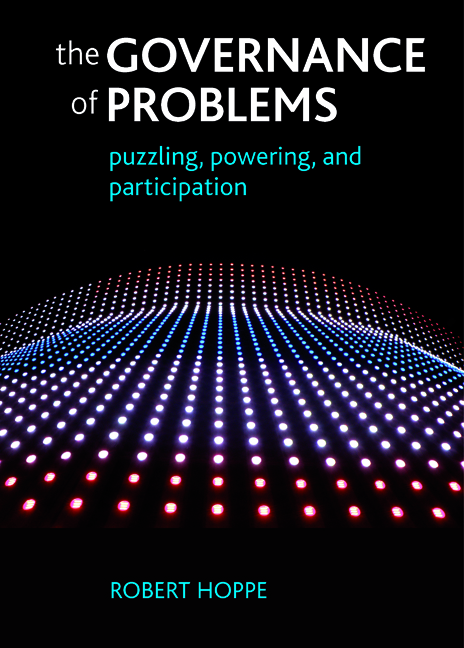Book contents
- Frontmatter
- Dedication
- Contents
- List of boxes, figures and tables
- About the author
- Preface
- one A problem-processing perspective on governance
- two The governance of problems: a map
- three Analysing policy problems: a problem-structuring approach
- four Cultures of public policy problems
- five Problem types and types of policy politics
- six Problem-structuring dynamics and meta-governance
- seven Making policy analysis doable and reflexive
- eight The plural democracies of problems: a meta-theory
- nine Public engagement and deliberative designs
- ten Responsible and hopeful governance of problems
- Bibliography
- Index
five - Problem types and types of policy politics
Published online by Cambridge University Press: 01 September 2022
- Frontmatter
- Dedication
- Contents
- List of boxes, figures and tables
- About the author
- Preface
- one A problem-processing perspective on governance
- two The governance of problems: a map
- three Analysing policy problems: a problem-structuring approach
- four Cultures of public policy problems
- five Problem types and types of policy politics
- six Problem-structuring dynamics and meta-governance
- seven Making policy analysis doable and reflexive
- eight The plural democracies of problems: a meta-theory
- nine Public engagement and deliberative designs
- ten Responsible and hopeful governance of problems
- Bibliography
- Index
Summary
[T]he identification of the nature of the policy subsystem in a given policy sector reveals a great deal about its propensity to respond to changes in ideas and interests. (Howlett, 2002: 237)
Introduction
The previous chapter looked at translation and framing dynamics from the perspective of the distribution of cultures in society. It inquired into congruencies of citizens’ ways of life with policy makers’ styles and strategies in problem framing and structuring. This chapter will deal with policy politics in policy networks. If policy making is intertwined cogitation and interaction (Wildavsky, 1980 [1979]), then policy politics is the combination of types of cognitive processes and styles of interaction, characteristic for problem processing in an issue domain. Policy politics is the specific mode or style of policy making among the set of political actors, proximate policy makers, stakeholders, civil society associations and citizens involved on a more or less continuous basis, and with more or less intensity, in processing a particular public issue or problem.
The idea of policy or issue domains means that, in a way, a political system at large becomes a ‘federation of sectors’ (Wildavsky, 1980 [1979]: 73). The incessant bombardment with demands facing a political system or polity is sorted or clustered in policy or issue domains. They are components of the political system organised around apparently similar or affiliated substantive political problems. These politico-administrative structures effectively couple decision makers to implementers and citizens, both top down and bottom up, in translation and framing dynamics of their own. Policy networks create de facto linkages between those controlling formal governance arrangements and those engaged in the subpolitics of running the normal, day-to-day social or socio-technical practices in less formal or completely informal arrangements on the ground.
Policy politics is to be distinguished from macro politics at national or international levels. At the macro-political level, the socialisation and politicisation of conflict is the essential political process in a democracy (Schattschneider, 1960 [1988]: 138). At the macro level, issues are processed serially, which is a severe restriction on the number of issues that can be handled simultaneously. The threat of system overload is omnipresent (Easton, 1965), but held in check by creating relatively autonomous policy domains.
- Type
- Chapter
- Information
- The Governance of ProblemsPuzzling, Powering and Participation, pp. 121 - 144Publisher: Bristol University PressPrint publication year: 2010

